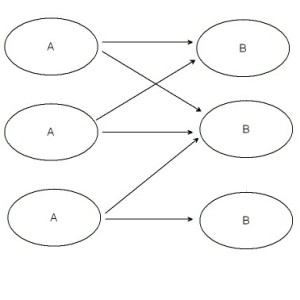The title of our blog ‘The Neural Network’ is very fitting as it’s synonymous with one of the most successful forms of artificial intelligence and one which is based on biology!
I thought it would be a good idea to write a series of articles introducing readers to neural networks as i’ll be looking at some of the applications and developments in psychiatry in articles to come.
What is a Neural Network? – An Example of a Competitive Network
A neural network structure is one which allows a computer to ‘learn’. The neural network can exist in a hardware or software format – the software forms are considerably easier to produce. There are several types of neural networks that are possible, all learning in slightly different ways. In this article, I will focus on a competitive neural network to explain some general principles. Consider figure 1 below.

Neural Network
Figure 1
There are two layers of cells – layers A and B. Cells in layer A are connected to cells in layer B through synapses. The idea behind the learning process is elegant and was formulated by the briliant psychologist Donald Hebb in the late 1940’s:
‘Cells that fire together wire together’
Suppose that all three cells in layer A fire at the same time and that this pattern of firing represents a sensory input – for arguments sake, let us suppose that it is seeing part of a circle.
What happens next is that the cells in layer B get a number of inputs. A lot of assumptions take place but again for the sake of simplicity, suppose that the total input to each cell in layer B is equal to the number of synapses from firing cells. We can see that the top cell in layer B has 2 inputs, the middle cell 3 inputs and the bottom cell 1 input. So the middle cell has the highest number of inputs.
The next assumption is that the ‘winner’ i.e. the cell with the highest number of firing inputs, then stops all the other cells in the layer from firing – a process referred to as competitive inhibition. The synapses to the winning cell are strengthened. The biological equivalent to this synapse strengthening has been suggested to lie in the process of long term potentiation.
The winning, middle cell in layer B, will now fire more strongly when the same pattern is produced in layer A cells. This ensures it is more likely to win when the same pattern is produced. In effect, the middle cell in Layer B has ‘memorised’ seeing part of a circle and we can call it a ‘part of a circle’ neuron.
So what does all this mean?
Through this process, we can see that at higher levels within this feedforward network (feedforward just means that information moves forward along the network), neurons encode more abstract forms of information. This is a possible mechanism for how ‘mirror neurons’ might exist for instance which have been suggested to be the neurobiological basis for empathy – and of course their inputs would be considerably more complex than the example above. Essentially however, we have a biologically plausible mechanism by which groups of interconnected neurons can learn either from environmental inputs or else from internally generated stimuli. Needless to say, such a model has implications for every area of psychiatry.

